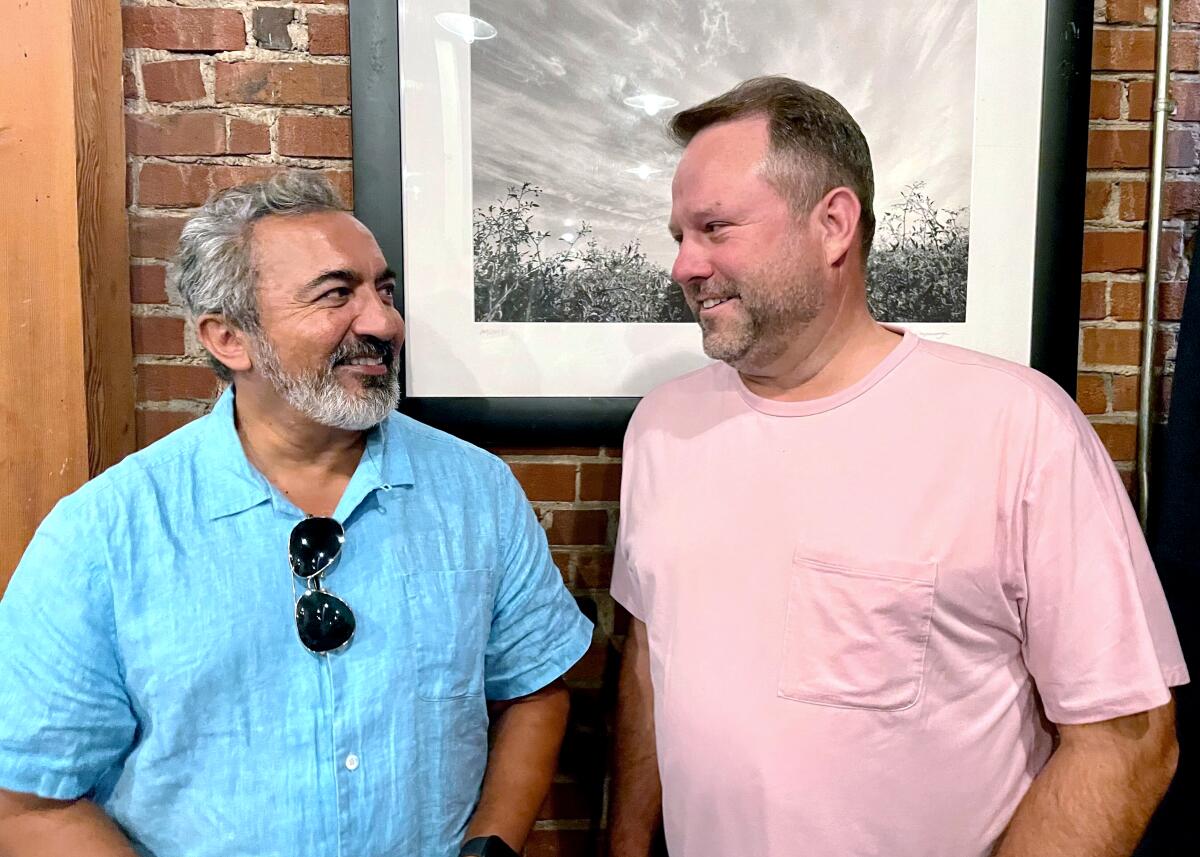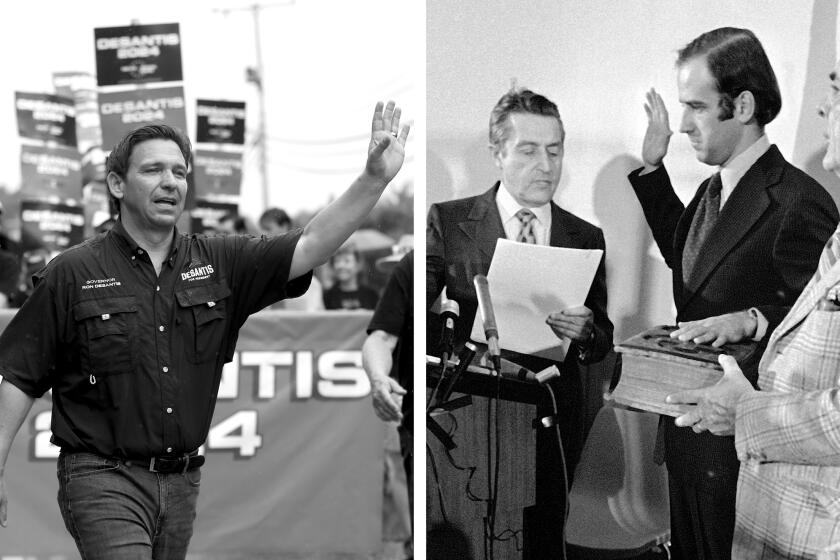Column: A Democrat and Republican battled for Congress. They became unlikely friends

- Share via
SACRAMENTO — Democrat Ami Bera was a first-time candidate seeking a Sacramento-area congressional seat. Rob Stutzman, a longtime GOP strategist, was working to defeat him.
Attacks — on the air, in newspapers, through the mail — flew like fists in an old Western.
Bera assailed Stutzman’s candidate, Republican Rep. Dan Lungren, as a bought-and-paid-for captive of special interests. Stutzman hung Nancy Pelosi and Democrat’s unpopular healthcare plan around Bera’s neck.
Bera lost that 2010 contest, then came back to beat Lungren two years later.
Fast-forward to a recent scene at an upscale restaurant near the Capitol.
Bera and Stutzman sit at a small table, smiling, tucking into a family-style dinner and sharing a bottle of wine. They toast, as friends do.
“It’s never personal,” says Stutzman, who wielded his political skills for a generation of Republican office-seekers, including Arnold Schwarzenegger.
“It’s about winning, right?” Bera responds with equal dispassion.
Alaska voters adopted a ranked-choice system to make it harder for extremists to win simply by appealing to the hard-liners in their party’s base. And it’s working.
Their improbably companionable relationship comes a time when partisan differences run marrow-deep and many Democrats and Republicans view their parties not as vessels of collected interests but warring tribes locked in mortal conflict.
As the former antagonists meet over a white tablecloth, the soundtrack — heavy on Sinatra, Ella Fitzgerald and Bobby Darin — is fittingly nostalgic, recalling a time when such cross-party relationships were far less noteworthy and rare.
“How did we end up in this place?” Bera asks of the country’s political combat footing. More importantly, he wonders, “How do we get out of here?”
The evening brings several courses, but no easy answers.
The two connected through a shared love of golf and their mutual contempt for Donald Trump.
Stutzman, who was widely quoted during the 2016 campaign disdaining the GOP front-runner, recalls spotting Bera that year at a French restaurant in downtown Sacramento. The congressman was hosting a reelection fundraiser. Stutzman stopped to say hello. “You and I should actually talk more about our politics,” Stutzman remembers Bera telling him.
“Trump was changing things,” Bera interjects.
“We were beginning to wake up that we have a lot to be alarmed about,” Stutzman replies.
Nothing came of their brief meeting until years later, when the two crossed paths again at a golf course near their Sacramento-area homes. Bera, a doctor and former dean at the UC Davis School of Medicine, had taken the game back up after a decade-long break. It was the perfect activity — outdoors, socially distanced — for life during the pandemic.
The two started chatting after finishing their respective rounds. About various congressional campaigns, mutual acquaintances, local politics, friends they shared, and Trump, their common foe.
They eventually played a few rounds together and hit it off.
It helped that Bera tends toward the center-left, with a business-friendly bent. (“Organized labor does not like Bera and neither do we,” the liberal group Progressive Scorecard asserts in giving the six-term congressman a thumbs-down rating).
Stutzman, for his part, is no longer as socially conservative as he once was. (After running a 2000 campaign to ban same-sex marriage in California, he has long since renounced that position.)
It also helped that both are self-described institutionalists: people who fundamentally believe in our government and political system and want to see them function better than they have in recent years.
Which means more maturity and pragmatism and less performative bombast and schoolyard antics.
“This next decade, I believe, you’re going to have very narrow majorities” controlling both houses of Congress, Bera says. Whether Democrats or Republicans are in charge, a relatively small group of extremists can grind things to a stop unless more lawmakers are willing “to negotiate toward the center ... each side getting a little of what they want and each giving up something.”
Stutzman nods in assent.
“At the end of the day, we’re all for the same type of success for the state, the country, local government,” he says. If a willingness to recognize that and seek common ground “makes us an odd couple” — he refers to his friendship with Bera — “I think that’s a sad commentary on today.”
Obviously, the two don’t agree about everything. On abortion, for instance, the congressman sharply criticizes the Supreme Court decision overturning Roe vs. Wade and the nationwide right to abortion. Stutzman is happy to let states go their own way, as they have, and set limits.
Bera is working all-out to reelect President Biden. Stutzman is leaning toward South Carolina Republican Sen. Tim Scott.
But they agree on the bigger picture, lamenting the incentive structure of today’s politics and the way it rewards conflict and inhibits cooperation and compromise. Fundraising, TV appearances, followers on social media — all rise in tandem with the levels of provocation and outrage that a politician produces.
How do you solve that? They shrug.
Every four years talk surfaces in California that this presidential campaign will be different and the state will play a king-making role. Don’t count on it.
More food. A discussion of Sacramento’s 2024 mayoral race
Question: If the right candidate came along, say, one willing to spend a ton of money to win a seat in Congress, would Stutzman sign on to work against Bera?
“At this point, no,” he says. “No.”
A pause. “Now, I’m not going to work for him, either.”
They burst out laughing. Bobby Darin sings about somewhere beyond the sea. A bottle of Irish whiskey arrives.
The Democrat and Republican pour two fingers each, then clink glasses.
More to Read
Get the latest from Mark Z. Barabak
Focusing on politics out West, from the Golden Gate to the U.S. Capitol.
You may occasionally receive promotional content from the Los Angeles Times.













